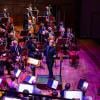
These are trying times for the San Francisco Symphony.
The search to replace Music Director Esa-Pekka Salonen, who departs the orchestra in June, has only recently gotten underway, and proposed budget cuts within the organization have begun to impact the 2024–2025 season, with performances of Verdi’s Requiem — which were to be Salonen’s first orchestral series concerts — canceled due to a strike by the Symphony Chorus.
With that program scrapped, the Baroque-themed concerts presented on Friday and Saturday, Sept. 27–28, became the de facto opening-weekend program of Salonen’s final season, following the Symphony’s gala concert on Wednesday, Sept. 25. Hearteningly, the orchestra’s performance on Saturday, which the Chronicle watched, brought a palpable sense of hope to Davies Symphony Hall, suggesting to musicians and listeners alike that the past just might be a place of refuge, if only for a couple nights.
Before he was one of today’s top classical composers, Nico Muhly was a choirboy studying Renaissance ecclesiastical music in Rhode Island. Slightly more recent fare — music by the 18th-century French composer Jean-Philippe Rameau — inspired Muhly’s new Piano Concerto, written for the Symphony and French keyboardist Alexandre Tharaud, who gave the piece’s world premiere this weekend.

Antique threads weave through Muhly’s score — a gesture here, an embellishment there — culminating in a hypnotic passacaglia (a Baroque lament) at the center of the work. Little by little, repeating chords in the piano blend into an orchestral smear; some of the chords are colorfast while others only turn a dull brown. It’s in the click-clack outer sections that the concerto finds its cross-century groove, a language fitting Muhly and Tharaud, both fans of Baroque music who, according to the pair, first connected online.
In fact, Throughline, Muhly’s small-ensemble piece for the Symphony that premiered virtually in November 2020, was the rare pandemic-era project worth a second listen. The 43-year-old composer, who lives in New York City, wrote it while acting as one of eight collaborative partners recruited by Salonen to create and curate new music for the ensemble in an effort to shake things up.
Those partnerships, announced by the Symphony at the time of the conductor’s appointment in 2018, formally ended last June. Yet this weekend’s program was novel in its own way. For the occasion, the orchestra dusted off two little-known reworkings of music by J.S. Bach: Edward Elgar’s grandiose transcription of the Fantasia and Fugue in C Minor and Paul Hindemith’s pint-sized prank of a piece, Ragtime (Well-Tempered). Both works were well played, if slight.

The real coup was getting a weightier Hindemith piece onstage: the Mathis Der Maler (Mathis the painter) Symphony.
The music, which comes from Hindemith’s rarely performed opera of the same name, evokes scenes from Christian iconography, and in this symphonic distillation, the drama is of biblical proportions. Christ dies to the tune of whispering strings. On Saturday, the strings’ sensitivity was matched only by the gauzy yet generous playing of the woodwind section, headed by principal flute Yubeen Kim and principal oboe Eugene Izotov. In another episode, angels, voiced by the low brass, play a concert of long-breathed melodies whose end, in this performance, came too soon.
Then, slithery horrors descend upon the hero. At the end of the opera, Mathis, based on the real-life 16th-century painter Matthias Grünewald, departs this world, just as Hindemith, whose works were condemned by the Nazis, would leave Germany forever. But the music would carry on.
This story was first published in Datebook in partnership with the San Francisco Chronicle.




